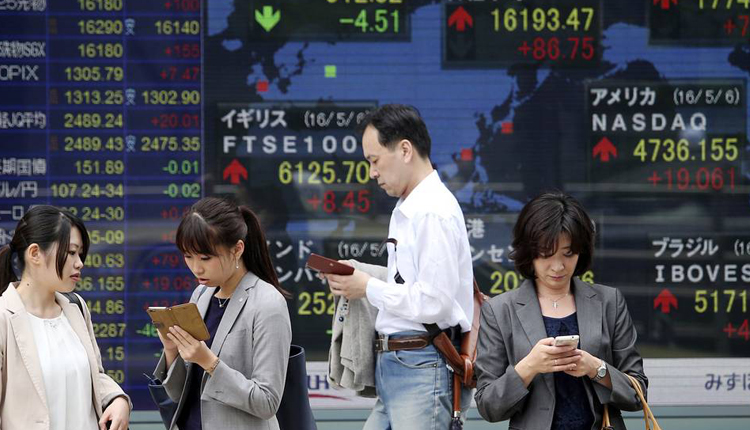Asian stocks fell on Wednesday as investors digested ongoing developments in the U.S.-China trade negotiations, which sent stateside shares tumbling overnight.
Mainland Chinese shares were mixed, with the Shanghai composite down about 0.1%, The Shenzhen component added 0.59% while the Shenzhen composite rose 0.767%.
Chinese trade data for April showed both exports and trade surplus missed expectations while imports surprisingly rose. Customs data showed trade surplus was $13.84 billion, far lower than the $35 billion analysts had expected.
April exports fell 2.7 percent from a year ago. They were expected to have risen 2.3 percent from a year earlier, according to economists Reuters polled.
Elsewhere in Asia, Japan’s Nikkei 225 dropped 1.52%, with shares of index heavyweights SoftBank Group and Fanuc both seeing declines. The Topix index also fell 1.64%.
In South Korea, the Kospi was down 0.14%, with Samsung Electronics shares declining more than 0.5%. The Hang Seng index in Hong Kong declined around 0.6%.
Australia’s ASX 200 also shed 0.39%, as most sectors traded lower.
“Asian markets are likely to consolidate again today, amid wavering if not dented investor sentiments,” analysts at Singapore’s OCBC Treasury Research wrote in a morning note.
Overnight in the U.S., the Dow Jones Industrial Average plunged 473.39 points to close at 25,965.09 — its biggest drop since January 3. The Dow had dropped as much as 648.77 points at its low of the trading day. The S&P 500 slipped 1.65% on the day to 2,884.05 while the Nasdaq Composite declined 1.96% to close at 7,963.76.
The Cboe Volatility Index, a measure of the 30-day implied volatility of the S&P 500 known as the “VIX” or the “fear gauge,” hit a fresh high of 21.09 on Tuesday, its highest level since January 22.
U.S. Trade Representative Robert Lighthizer told reporters that the U.S. will increase levies on Chinese imports on Friday.
“It’s difficult to see how this is not going to happen,” Tim Seymour, chief investment officer at Seymour Asset Management, told CNBC’s “Squawk Box” on Wednesday. “The strategy it seems this week has changed to one where there’s political impetus … to dig in.”
Lighthizer’s comments came after U.S. President Donald Trump’s tweeted that current tariffs of 10% on $200 billion of Chinese goods would be raised to 25% on Friday. Trump also threatened to impose an extra 25% levy on another $325 billion of Chinese goods “shortly.”
The latest developments have sent markets across the globe reeling, following earlier indications that the U.S. and China could be close to ending their protracted trade war. Just last month, U.S. Treasury Secretary Steven Mnuchin told The New York Times that negotiations were in the “final laps. ”
The U.S. dollar index, which tracks the greenback against a basket of its peers, was at 97.452 after rising from levels below 97.5 yesterday.
The Japanese yen, viewed as a safe-haven currency, traded at 109.98 against the dollar after strengthening from levels above 110.5 in the previous session. The Australian dollar changed hands at $0.7022 from levels around $0.704 seen yesterday.
Oil prices rose in the morning of Asian trading hours, with the international benchmark Brent crude futures contract adding 0.52% to $70.24 per barrel. U.S. crude futures added 0.77% to $61.87 per barrel.
Source: CNBC


